Intuition

Intuition is the ability to acquire knowledge without recourse to conscious reasoning. Different fields use the word "intuition" in very different ways, including but not limited to: direct access to unconscious knowledge; unconscious cognition; inner sensing; inner insight to unconscious pattern-recognition; and the ability to understand something instinctively, without any need for conscious reasoning. The word intuition comes from the Latin verb intueri translated as "consider" or from the late middle English word intuit, "to contemplate".
Quotes
[edit]- Intuition is the wisdom formed by feeling and instinct - a gift of knowing without reasoning... Belief is ignited by hope and supported by facts and evidence - it builds alignment and creates confidence. Belief is what sets energy in motion and creates the success that breeds more success.
- Angela Ahrendts in:Angela Ahrendts Reveals The Secret To Burberry’s Success, Vogue, 5 August 2013.
- Always follow the line of thought of the intuition negating envy.
- Giannina Braschi, United States of Banana (2011) p 153
- Intuition is the positive energy that envy kills when it refuses to see the rainbow in the sky.
- Giannina Braschi, United States of Banana (2011) p 153
- Intuition is the driving force that is not drawn back by any bad feeling. Intuition renews itself -n ot knowing the whereabouts of progress nor questioning the origin of progress—letting it be as it is in its simplicity.
- Giannina Braschi, United States of Banana (2011) p 154
- Intuition is the very force or activity of the soul in its experience through whatever has been the experience of the soul itself.
- Edgar Cayce, John Van Auken in:The Psychic Sense: How to Awaken Your Sixth Sense to Solve Life's Problems and Seize Opportunities, ARE Press, 2006, p. 76.
- Trust your hunches. They're usually based on facts filed away just below the conscious level.
- Joyce Brothers, As quoted in Words of Wisdom : More Good Advice (1990) edited by William Safire and Leonard Safir, p. 199.
- Mathematics as an expression of the human mind reflects the active will, the contemplative reason, and the desire for aesthetic perfection. Its basic elements are logic and intuition, analysis and construction, generality and individuality.
- Richard Courant in: Richard Courant, Herbert Robbins What is Mathematics?: An Elementary Approach to Ideas and Methods, Oxford University Press, 1996, p. 23.
- The two operations of our understanding, intuition and deduction, on which alone we have said we must rely in the acquisition of knowledge.
- Rene Descartes in: Key Philosophical Writings, Wordsworth Editions, 1997, p. 31.
- There is no logical way to the discovery of these elemental laws. There is only the way of intuition, which is helped by a feeling for the order lying behind the appearance.
- Albert Einstein in: Morton A. Meyers Happy Accidents: Serendipity in Modern Medical Breakthroughs, Arcade Publishing, 2007, p. 14
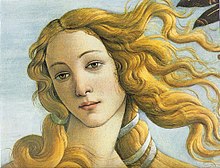
- God gave women intuition and femininity. Used properly, the combination easily jumbles the brain of any man I've ever met.
- Farrah Fawcett in Norman M. Brown, Ellen S. Amatea Love and Intimate Relationships: Journeys of the Heart, Psychology Press, 2000, p. 297.
- Intuition Peak is the sharp peak of elevation 780 m in Levski Ridge, Tangra Mountains, Livingston Island, situated 1.4 km NNW of Helmet Peak and 5.4 km SE of Atanasoff Nunatak. According to the Bulgarian topographic survey Tangra 2004/05. It is named in appreciation of the role of scientific intuition for the advancement of human knowledge.
- SCAR Gazetteer in: Intuition Peak, Composite Gazetteer Of Antarctica.
- Being in a multicultural environment in childhood is going to give you intuition, reflexes and instincts. You may acquire basic responsiveness later on, but it's never going to be as spontaneous as when you have been bathing in this environment during childhood.
- Carlos Ghosn in: Richard M. Smith Carlos Ghosn: In the Driver’s Seat, Newsweek, 20 June 2008.
- Your time is limited, so don't waste it living someone else's life. Don't be trapped by dogma - which is living with the results of other people's thinking. Don't let the noise of others' opinions drown out your own inner voice. And most important, have the courage to follow your heart and intuition.
- Steve Jobs in: Commencement address delivered by Steve Jobs, on June 12, 2005. Text of Steve Jobs' Commencement address (2005), Stanford News, June 14, 2005.
- Intuition and concepts constitute... the elements of all our knowledge, so that neither concepts without an intuition in some way corresponding to them, nor intuition without concepts, can yield knowledge.
- Immanuel Kant in: Wayne P. Pomerleau Twelve Great Philosophers: A Historical Introduction to Human Nature, Rowman & Littlefield, 1 January 1997, p. 243.
- Women have fantastic intuition. I think they come more naturally to grace; tenderness and affection are considered feminine qualities. It's important for men to learn from women those characteristics that don't come as naturally to us. I think my father was raised in a time when those things were taught to be signs of weakness; that is, if you were sensitive and aware in a different way from just the macho version. It's wonderful that that's changing.
- Val Kilmer, "(Man)ifesto: Val Kilmer on Compassion—and Kissing Angelina Jolie" by Kristin Coronado, Redbook (December 2004), p. 30.
- The only justice is to follow the sincere intuition of the soul, angry or gentle. Anger is just, and pity is just, but judgement is never just.
- D. H. Lawrence in Leslie Paul Thiele The Heart of Judgment: Practical Wisdom, Neuroscience, and Narrative, Cambridge University Press, 04-Sep-2006, p. 195.
- Intuition is the key to everything, in painting, filmmaking, business - everything. I think you could have an intellectual ability, but if you can sharpen your intuition, which they say is emotion and intellect joining together, then a knowingness occurs.
- David Lynch in: Andy Battaglia David Lynch, A.V. Club, 23 January 2007.
- What is of the essence of what is perfectly known cannot be defined; for the more a thing is known, the more it brings us to intuition, which excludes all equation.
- Joseph de Maistre, An Examination of the Philosophy of Francis Bacon (1836), p. 70
- Intuition becomes increasingly valuable in the new information society precisely because there is so much data.
- John Naisbitt in: Larry Chang Wisdom for the Soul: Five Millennia of Prescriptions for Spiritual Healing, Gnosophia Publishers, 2006, p. 419.
- A leader or a man of action in a crisis almost always acts subconsciously and then thinks of the reasons for his action.
- Jawaharlal Nehru, Autobiography (1936; 1949; 1958), p. 506 (1949), p. 310 (1961); On Mahatma Gandhi
- It is through science that we prove, but through intuition that we discover.
- Henri Poincare in: Shelley Sacks, Wolfgang Zumdick Atlas of the Poetic Continent: Pathways in Ecological Citizenship, Temple Lodge Publishing, 2013, p. 60.
- The famous philosopher's stone cannot be discovered or created without the participation of woman... The first task which faces women is to insist in all countries upon full rights and equal education with men; to try with all their might to develop their thinking faculties, and, above all, to learn to stand on their own feet without leaning altogether upon men. In the West there are many fields which are now available to women, and one must admit that they are quite successful in all of them.
It is necessary to awaken in woman herself a great respect for her own Origin; she should realize her great destiny as a bearer of the higher energy. Indeed, it is woman's intuition which should again, as in the better periods of history, lead humanity on the path of progress...- Helena Roerich, in Letters of Helena Roerich II, (1937)
- The combinations of the luminaries are favorable for the awakening of women, and I believe that the new influx of psychic energy will be utilized by women for lofty tasks and in search of new achievements for the good of humanity. Let the fire of achievement in the name of great service be truly kindled in woman. The quality of self-sacrifice is fundamental in woman, but she should learn not to limit her self-sacrifice to the narrow concept of home life, which is often nothing more than encouragement of the family's egotism— she should apply it on a world scale. I believe that woman should be even more educated and cultured than man, for indeed it is she who instills in her family the first concepts of knowledge, culture, and understanding of statesmanship.
- Helena Roerich, in Letters of Helena Roerich II, (1937)
- In all domains of science, art, social work, and government, woman has proved to be capable of reaching the greatest heights when circumstances were favorable... And the many other talented women—actresses, painters, poets, among all nationalities! So many wise leaders, warriors, and great saints among women! The image of St. Theresa, the Spaniard, is not less than that of St Francis of Assisi... It would be well to also remember the slandered image of Aspasia. Socrates used to call her his teacher, and the great Plato mentioned her reverently in his writings. Also, through her many useful reforms the reign of the woman-Pharaoh, Hatsepsut, far surpassed that of many Pharaohs. And was she not the one who, by her wise rule, paved the way for the latter victories of Tethmosis III?
- Helena Roerich, in Letters of Helena Roerich II, (1937)
- Alles Anschauen gehet aus von einem Einfluß des Angeschaueten auf den Anschauenden, von einem ursprünglichen und unabhängigen Handeln des ersteren, welches dann von dem letzteren seiner Natur gemäß aufgenommen, zusammengefaßt und begriffen wird.
- All intuition proceeds from an influence of the intuited on the one who intuits, from an original and independent action of the former, which is then grasped, apprehended, and conceived by the latter.
- Friedrich Schleiermacher, On Religion (1799), as translated by Richard Crouter (Cambridge: 1988), pp. 24-25.
- Intuition is a spiritual faculty and does not explain, but simply points the way.
- Florence Scovel Shinn (1989), Wisdom of Florence Scovel Shinn, p. 65.
- Trust yourself. You know more than you think you do.
- Benjamin Spock, Baby and Child Care, 1977.
- The comfort zone is the great enemy to creativity; moving beyond it necessitates intuition, which in turn configures new perspectives and conquers fears.
- Dan Stevens in: Dan Stevens: my week on the porch, The Telegraph, 6 January 2013.
- G. H. Hardy: It's not that I can't see what you've claimed. It's that I'm not sure that you know how you got there. Or, indeed, that your claims are correct. There are subtleties, which …
S. Ramanujan: But they are right, sir. I have more important new ideas.
G. H. Hardy: Yes, but intuition is not enough! It has to be held accountable!
- The suppression of the feminine principle especially over the past two thousand years has enabled the ego to gain absolute supremacy in the collective human psyche. Although women have egos, of course, the ego can take root and grow more easily in the male form than in the female. This is because women are less mind identified than men. They are more in touch with the inner body and the intelligence of the organism where the intuitive faculties originate. The female form is less rigidly encapsulated than the male, has greater openness and sensitivity toward other lifeforms, and is more attuned to the natural world.
- If the balance between male and female energies had not been destroyed on our planet, the ego's growth would have been greatly curtailed. We would not have declared war on nature, and we would not be so completely alienated from our Being... The suppression of the feminine principle especially over the past two thousand years has enabled the ego to gain absolute supremacy in the collective human psyche. Although women have egos, of course, the ego can take root and grow more easily in the male form than in the female. This is because women are less mind identified than men. They are more in touch with the inner body and the intelligence of the organism where the intuitive faculties originate. The female form is less rigidly encapsulated than the male, has greater openness and sensitivity toward other lifeforms, and is more attuned to the natural world.
- It's a lot easier to have good intuition when you know what the answer is.
- Stephen Wolfram, (April 18, 2020)"Stephen Wolfram: Cellular Automata, Computation, and Physics | AI Podcast #89 with Lex Fridman". YouTube. (quote at 1:32:00 of 3:11:08)
Einstein and the Poet: In Search of the Cosmic Man (1983)
[edit]Albert Einstein, William Hermanns, in: Einstein and the Poet: In Search of the Cosmic Man, Branden Books, 1 April 1983


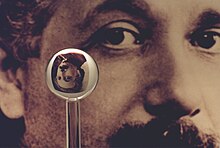
- My intuition made me work. Many people think that the progress of the human race is based on experiences of an empirical, critical nature, but I say that true knowledge is to be had only through a philosophy of deduction. For it is intuition that improves the world, not just following the trodden path of thought. Intuition makes us look at unrelated facts and then think about them until they can all be brought under one law. To look for related facts means holding onto what one has instead of searching for new facts. Intuition is the father of new knowledge, while empiricism is nothing but an accumulation of old knowledge. Intuition, not intellect, is the open “sesame” of yourself.
- Albert Einstein in:p.16.
- I asked, "If God reveals himself in nature, why not in man?" "Have you never been awed by the power of man's rational mind?" Einstein quizzed. "And man's intuition, man's inspiration>?
- William Hermanns, , p. 26.
- Prophet or not, what I say is more often felt through intuition than thought-through-intellect.I hope the nations will learn their lesson, that there is no security in national armies. After the war we must renounce all military defense and create an atmposphere of international trust.
- Albert Einstein in: p. 56.
- The truly religious man has no fear of life and no fear of death; his faith must be in his conscience. Then he will have the intuition to observe and judge what happens around him. Then, he can acknowledge that everything unfolds true to strict natural law, sometimes with tremendous speed. I am therefore against all organized religion, too often in history, men have followed the cry of battle rather than the cry of truth.
- Albert Einstein in: p. 65.
- I'm a mystic, and you, too, because you love intuition. And I believe that the soul is eternal, or, if you wish, the mind is eternal and carries experiences from one plane of existence to another or from one time period to another- since we have bodies to fulfill a purpose, and they are involved with space and time.
- William Hermanns, in: p. 71.
- Intuition and the opportunity to be at the right place at the right time. I couldn't have come to my conclusions without the discoveries before me of great scientists.
- Albert Einstein in:P.88.
- I have faith in my intuition, the language of my conscience, but I have no faith in speculation about Heaven and Hell. I'm concerned with this time — here and now.
- Albert Einstein in: p. 94.
- There are only two limiting factors: first, that what seems impenetrable to us is as important as what is cut and dried, and, second that our faculties are dull and can only comprehend wisdom and serene beauty in crude forms, but the heart of man through intuition leads us to greater understanding of ourselves and the universe.
- Albert Einstein in: p. 109.
- Farewell scheming intellect -
my soul be my only property,
the intuition be my profit
to set my neighbor free.- William Hermanns in: p. 136.
- Knowledge is necessary, too. An intuitive child couldn't accomplish anything without some knowledge. There will come a point in everyone's life, however, where only intuition can make the leap ahead, without ever knowing precisely how. One can never know why, but one must accept intuition as fact.
- Albert Einstein in: p. 137.
The Life Divine (1990)
[edit]
Sri Aurobindo in: The Life Divine, Lotus Press, 1990
- ..spaceless Being who alone renders time and space and cosmos possible, and in all these the higher truth realisable by the lower term, justify themselves to the deliberate reason as well as to the persistent instinct or intuition of mankind.
- In: p. 8.
- The conscious existence involved in the form comes, as it evolves, to know itself by intuition, by self-vision, by self-experience. It becomes itself in the world by knowing itself; it knows itself by becoming itself.
- In: p. 50.
- Man, because he has acquired reason and still more because he has indulged his power of imagination and intuition, is able to conceive an existence higher than his own and even to envisage his personal elevation beyond his present state into that existence.
- In: p. 63.
- We have seen what pure Reason, intuition and experience have to say about pure Existence, about Sat; what have they to say about Force, about Movement, about Shakti?
- In: p. 88.
- Intuition is the supra-logic that cuts out all routine processes of thought and leaps straight from the problem to the answer.
- Robert Graves, quoted in: Harvey A. Dorfman, Carlos Tosca (2003), Coaching the mental game, p. 146.
- Still beyond can be met a yet greater power of the Truth-Force, an intimate and exact Truth-vision, Truth-thought, Truth-sense, Truth-feeling, Truth- action, to which we can give in a special sense the name of Intuition; for though we have applied that word for want of a better to any supra-intellectual direct of knowing, yet what we actually know as intuition is only one special moment of self-existent knowledge.
- In: p. 293.
- Over mind in the descent towards material creation has originated modifications of itself, — Intuition especially with its penetrative lightning flashes of truth lighting up local points and stretches of country in our consciousness...
- In: p. 304.
- It is not indeed possible, so long as we are compelled to use reason as our main support, for it to abdicate altogether in favour of an undeveloped or half organised intuition; but it is imperative on us in a consideration of the Infinite and its being and action to enforce on our reason an utmost plasticity and open it to an awareness of the larger states and possibilities of that which we are striving to consider...
- In: p. 347.
- Each by itself is not really known; we only begin to know it in its deeper truth when we can read into it the suggestions of its apparent opposite. It is through such a profounder catholic intuition and not by exclusive logical oppositions that our intelligence ought to approach the Absolute.
- In: p. 396.
- But although our primary evidence of the objects of the universe consists of a structure of sense-images, these are completed, validated, set in order by an automatic intuition in the consciousness which immediately relates the image with the thing imaged and gets the tangible experience of the object, so that we are not merely regarding or reading a translation or sense-transcript of the reality but looking through the sense image to the reality.
- In: p. 446.
- All finites are in their spiritual essence the Infinite and, if we look deep enough into them, manifest to intuition the Identical and Infinite.
- In: p. 483.
- ... the secret of its operations [subliminal sense] is unknown and its principles of sign- construction and symbolic figure-languages foreign; a greater inner power of intuition, tact, discrimination is needed to judge and interpret rightly its images and experiences.
- In: p. 558.
- To these means is added a reason, intelligence and intuition which seize on the communications thus indirectly brought to them, put all in order and utilise their data to get as much knowledge and mastery and possession of the not-self or as much partial unity with it as the original division allows to the separated being.
- In: p. 571.
- ... spiritual and psychic. The traditional account of this inner witness is conscience, a power of perception in us half mental, half intuitive; but this is something superficial, constructed, unreliable: there is certainly within us, though less easily.
- In: p. 634.
- In all this enlightened obscurity of our mental parts a secret intuition is at work, a truth-urge that corrects or pushes the intelligence to correct what is erroneous, to labour towards a true picture of things and a true interpretative knowledge. But intuition is itself limited in the human mind by mental misprision of its intimations and is unable to act in its own right for whether it be physical, vital or mental intuition …
- In: p. 643.
- The mind in seeking for such a Reality and testing each thing from Matter upwards to see if that might not be It, has not proceeded on a wrong intuition. All that is necessary is to carry the inquiry to its end and test the highest and ultimate levels experience.
- In: p. 682.
- Even if, as modern Science insists, religion started from animism, spirit-worship, demon-worship, and the deification of natural forces, these first forms only embody in primitive figures a veiled intuition in the subconscient, an obscure and ignorant feeling of hidden influences and incalculable forces
- In: p. 728
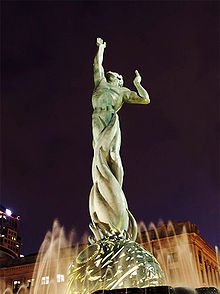
- The intuitions that he thus received by contact with Nature, his mind systematized and so created the early forms of religion. This active and ready power of intuition also gave him the sense of supra-physical forces behind the physical, and his instinct and a certain subliminal or super normal experience of supra-physical beings with whom he could communicate...
- In: p. 900.
- In India, we have seen a persistence of the original intuition and total movement of evolutionary nature.
- In: p. 906-07.
- An intuition in the heart sees the truth
- In Rig Veda, p. 924.
- Intuition is a power of consciousness nearer and more intimate to the original knowledge of identity; for it is always something which leaps out direct from a concealed identity. It is when the consciousness of the subject meets with the consciousness in the object, penetrates it and sees, feels or vibrates with the truth of what it contacts, that the intuition leaps out like a spark or lightning-flash from the shock of the meeting…
- In: p. 983.
- May the invincible rays of his intuition be there seeking immortality, pervading both the births; for by them he sets flowing in one movement human strengths and things divine.
- In Rig Veda, p. 1053.
Australian elite leaders and intuition (2006)
[edit]Martin Robson, Peter Miller Australian elite leaders and intuition, Southern Cross University, 2006
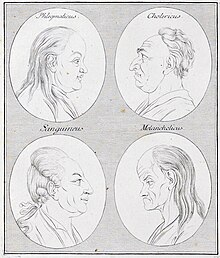
- Intuition is defined as a non-rational, holistic, cognitive process that is enhanced by experience and associated with affect.
- Jung (1977), legitimised intuition to some extent through defining the four basic psychological functions as intuition, thinking, feeling and sensation, and these concepts have been incorporated into standardised personality evaluation tests used daily all over the world.
- Interest in the use of intuition as a viable approach to decision-making and judgements in environments of rapid change and complexity has increased in recent years.
- Intuition as a judgement/decision-making skill is important for contemporary leaders because it is more able to cognitively process complex systems than our rational minds.
- V. Denes-Raj and S. Epstein (1994).
- Much of the confusion surrounding intuition, adding to the complexity of conducting research on intuition, is due to the use of this term in so many ways.
- O. Behling and N. Eckel (1991).
- Intuition has long been associated with the mystic, irrational and paranormal.
- D. Cappon (1994).
Descartes's Changing Mind (2009)
[edit]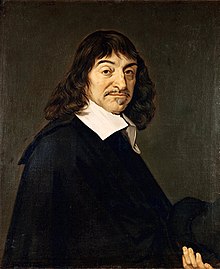
Peter Machamer, J. E. McGuire Descartes's Changing Mind, Princeton University Press, 06 July 2009
- Concomitantly, the shift away from intuitions of simple natures is accompanied by a shift away from abstraction, as the epistemic model for gaining knowledge, to a model that requires many of our core ideas to be innate in the mind. Thus, in place of the earlier methods of abstracting by direct intuition and compunding from sensuous and non-sensuous experience, increasingly Descartes brings to the fore the view that knowledge always involves innate ideas.
- In: p. 3.
- In the Rules Descartes ties abstraction to intuition. The two main characteristics of intellectual intuition are first, the purely intellectual nature of the operation itself and, second, the absolute certainty and assurance that accompanies it. Thus, an intuition is an insight into necessary connections between the two simple ideas or two elements of an idea.
- Descartes in: p:7.
- By “intuition,” I do not mean the fluctuating testimony of the senses or the deceptive judgment of imagination as it botches things together, but the conception of a clear and attentive mind, which is so easy and distinct that there can be no doubt about what we are understanding. Alternatively, it comes to the same thing intuition is the indubitable conception of a clear and attentive mind which proceeds solely from the light of reason.
- Descartes in: p:9.
- Our analysis of the performative nature of the cogito should make clear that for Descartes its validity is an immediate intuition of a truth contained in an idea grasped in an instant, an intuition that contains no temporal successiveness.
- In: p. 69.
- But he [Descartes] also makes clear that he is appealing to a mental intuition with roots in the Rules. This is the notion that we possess mental acts whose content is such that we are not “aware of a movement or a sort of sequence,” as is the case in deductive chains of reasoning.
- In: p. 70.
- Thus, Descartes makes a clear distinction, in the Second Reply, between the truth of a mental content to which we immediately attend and that truth recalled by memory when the initial intuition is no longer attended to. He illustrates his point in reference to the cognito: When someone says “I am thinking, therefore I am , or exist,” he does not deduce existence from thought by means of syllogism, but recognizes it as something self-evident by a simple intuition of the mind.
- In: p. 71.
- Descartes defines intuition as the conceptual act of the pure and attentive mind.that springs from the light of reason alone.
- In: p. 166.
- Descartes, by means of intuition and abstraction, seeks to establish the ultimate features of things as they are in themselves; that is, he seeks to establish an objective ontology of natures that compose material bodies.
- In: p. 178.


